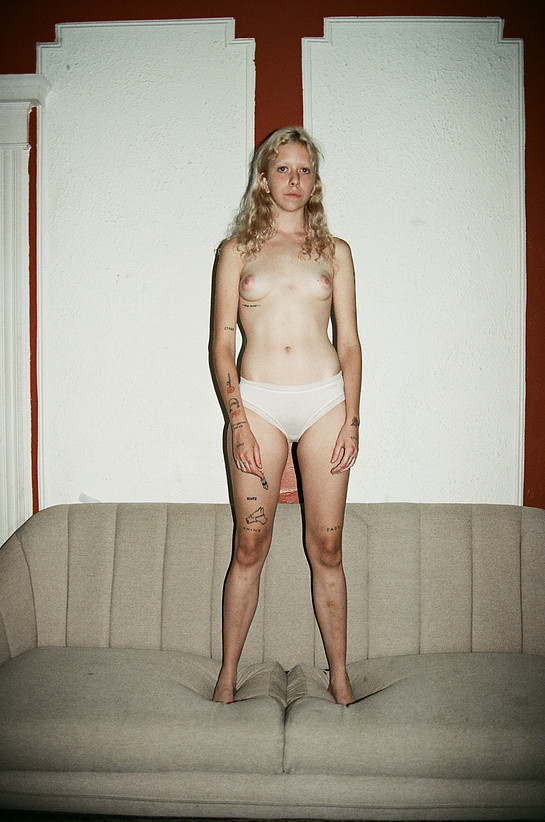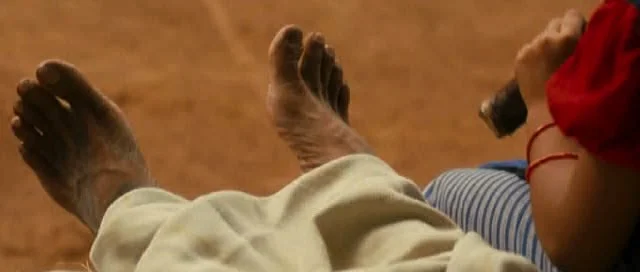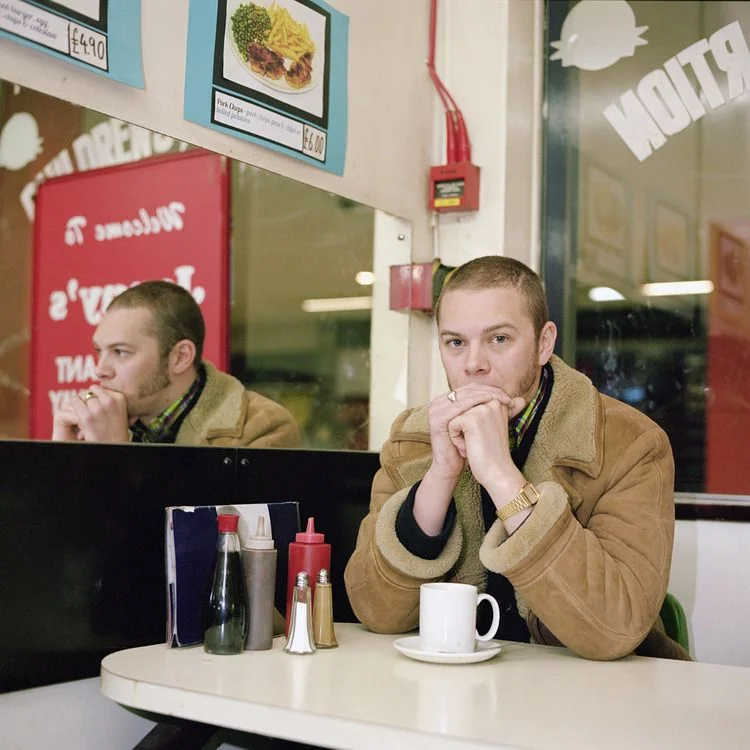Yuki Kasai-Pare
Her portraits take me back to long summers during my adolescence where all was warm... sweaty, but warm nonetheless. Perhaps it’s because of her up-close and personal approach to photography, which bleeds with love for the subject. Or perhaps it’s because of her intuitive and visceral outlook, which also bleeds with love for the subject. Either way, one look is all it takes in order for you to feel something, whatever that may be. I picked on Yuki’s brain to gain some insight about her work.
It’s my understanding that you were born in Japan, and then moved to Canada when you were in middle school. Does your background have an influence on your work as well as how you work?
I was actually born in Montreal, but I grew up in Miyazaki, Japan where there were almost no foreigners, until I moved to Montreal when entering High School. I do feel that this influenced most things I do, since I would be considered as ‘somewhat other’ no matter where I go. I feel like many mixed people have this experience, but I was always seen as physically and culturally ambiguous and in-between - I don’t consider this as bad. It took some time but I learned to be comfortable in this in-betweenness. I would always feel constantly one step away from ‘blending in,’ which I think made me develop an acute attention to cultural codes, or just details in general. I consider photography itself to be a kind of ‘step away’ [from something]. It’s a kind of stance that observes something while being inside it or close to it. That might be why I was drawn to photography; it’s pretty close to how I was already seeing the world. I also paint a lot, and they are mostly abstract forms of paintings - it also links back to this kind of sustained stance of abstraction, I guess.
That’s an interesting way of seeing photography. As a mode of expression, what does photography offer that others don’t? What makes photography an apt art form for you to translate your vision?
There's something very violent about photography, in the sense that it’s a cutting off and stealing something that could have kept on existing regardless of the lens. It can also create something that would never exist and present it as a trace of reality. Photography is also special for me because it cuts through time. I can work for days and months and years on a painting or writing or physical object but photography has no other way but to be an instant thing. It can become a kind of visible ‘now.’ Because of how familiar it’s become to us as a medium nowadays, we all realize the potential of photography to a certain degree- how false, real, humanizing but dehumanizing, and instant it can be. But we also realize how eternal it is. I guess I am drawn to how contradictory in nature photography is.
You take a lot of portraits of your friends and loved ones. This camaraderie is clear in your work. What essence do you try to capture upon taking pictures of people you know?
I’m happy to hear that there is a clear camaraderie in my photos! I think that's one of the things I care about most. There's always a fear in framing people I love, cherish, and respect, into a little square. I do not want to flatten the kind of immeasurable energy and beauty they have for me. The best I can do is to seek some form of authenticity... whatever that is. It's a lot to ask for the subject to feel like the picture represents them, but I want the result to at least have the feeling, the resonance of who they are in the flesh and in presence.
What makes you want to pick up your camera and take photos? Could you talk about who/what inspires your work?
Generally, my own dreams or stories that people tell me are my biggest inspiration sources. I love to continue the dreams or stories that I remember in my mind. Daydreaming about things like dreams, phobias, fears, rage, melancholy, and disgust also really drives me creatively. When I’m actively seeking inspiration, reading and writing is what I turn to. I love reading affect theory or phenomenology or ethnographies, as they give me tools of perception. I have so much respect for writers because I find writing to be the ultimate form of image-making that doesn't even need to be pictorial to affect us. It gives us everything but leaves us with the illusion of creating our own image. I wish my art could have that kind of power. I’m still at the very beginning of finding my own vision and so, for now, I’m really just inspired by anything that can help me structure or challenge the ways in which I see and consider things at first hand.
‘It gives us everything but leaves us with the illusion of creating our own image’- I love that. Finding your own voice is one of the most crucial things in art. You mentioned how you’re still searching for it. Amidst a world where trends die faster than they were born, how do you maintain your unwavering worldview?
As I mentioned, I don’t think I’ve really found a concrete ‘voice’ yet. Maybe I’ll always be flowing. I actually think that I take trends very seriously despite or, actually, specifically because of their ephemeral quality. Trends are always flowing because people take their own vision so seriously and I find that fascinating. You can find your ‘own’ through trends and especially through their deaths. The feeling of ‘I’m so over that shit’ is so interesting- we’ll look at a meme we were crying of laughter the day before and then say ‘yeah, whatever, I already saw it.’ There’s something so telling about how we consider things and ideas as ‘our own’ even when it's coming from others, while simultaneously having the urge to show and share everything with others so badly. This sense of ownership is something that I both embrace but also try to battle. To go back to the question, I guess moments where I feel most like ‘myself’ is when I find a flow that comes from a kind of introspection- an introspection not of the ‘now’ but a kind of arc that starts from my past and its death, and ends in my idealized future. That’s when I get the feeling of speaking in my own voice- in my ‘now.’
Life and death and its cycle... that’s what I got from your answer, even though that may be completely wrong (laughs). Your photography, as well as your paintings, seem so raw and inhibited. Of course, some of your photographs are more on the properly composed side, but it seems as though a good number of them are free and for the lack of a better word, off-kilter. Is having an individual that can express themselves easily an essential factor for you? How do you try to find that sweet spot between ‘natural’ and ‘uncanny’?
Photos themselves are by nature so uncanny to me! It’s always fake and always real and so haunting- like the discomfort in looking at old family photos or photos of ourselves. I feel like nowadays we’re well aware of this in a way, thanks to photo apps with face recognition and whatnot. We’re always one step away from both terror and beauty. In practice, I consider the subject of my photos to perhaps be the most important factor for me. Not as in how ‘beautiful’ they are or what the individual themselves can express ‘for’ me, but as in, whether or not a flow between us can be born. I really value this flow between two or more people. I value it over attaining perfection since perfection is a kind of settlement. And I want to keep the unsettled quality of a flow. Perhaps this borderline uncanniness in my photos comes from this.
Right! This constant flow is something I love about your work. Would you say there’s a recurring theme/message in your photography? If so, how do you channel the said theme/message?
I don’t know if I really have a message that I want to pass on. I actually want my stuff to be the opposite of a message. Regardless of the medium I’m working with, I do not want the result to be a kind of ‘final form’ like beauty, a tear, or the object. Rather, I want it to be a process. I want my photos to have a suspended effect, and have a state that hints towards something else for the onlooker- whatever it is that it points to. I want the image to remain an image, in some sense. I feel like I want to further work on how I could better channel that.
What’s the best advice you have received regarding photography? Did you have any mentors or role models that you looked up to upon just getting started?
I’m self-taught in most of my creative practices, so I never had a direct mentor per say, at least as of now, but the people I looked up to and influenced my ways of seeing are filmmakers. To name a few names- Hara Kazuo, Apichatpong Weerasethakul, Pedro Costa, Chick Strand, or Wang Bing and wow, so many more! Thinkers that tackle questions of images have impacted me a lot- like Bazin or Walter Benjamin's text on photography and such. My friends, and artists around me and music and nature and... I could go on but there are just so many mentors everywhere. It’s kind of overwhelming sometimes.
In this day and age, digital photography seems to be the more dominant power in comparison to analog photography. Correct me if I’m wrong, but you take a lot of your photos using a film camera. What are the challenges you face in trying to strike a balance between using the medium you prefer and the medium that’s more used in a fast-paced world? What are your thoughts re the push and pull that exists between analog and digital?
I kind of freak out when I think of how fast the technology of the image is developing these days. It sees so much, so much more than any human can actually see, and that itself is pretty uncanny. I do really like it though- there’s a satisfying tingle in being able to zoom into details like skin, hair, dust and so on. I guess we’re so in touch with the virtual now that past notions of realism isn’t even real to us anymore. I mentioned earlier about how I was drawn to how fast photography can be and how it can cut time, but film photography gives me slight break from that. Not seeing what you just took is a nice tease. It can leave you in the flow of the moment without having to look at what you just shot. In a way, it doesn’t overstep. It’s a very humble medium- at least in 2018. It doesn't see more than what our raw eyes can see. I like that there's a lag, an anticipation, and a kind of letting-go. I feel like it’s also closer to how we store memories in our mind.
The way you answer is so poetic and beautiful. Thanks so much for speaking to me today. Last question: Could you talk about what you’d like to accomplish in the near future? What are your dreams?
My near future goal would be to create more, explore more spaces, worlds, and people, feeling connected to others through art while also maintaining a healthy state of inconsistency. My ultimate dream is to remain a bad bitch, keep being surrounded by friends I love- and eventually grow old in a house by the beach with my cat.
Images courtesy of YUKI KASAI-PARE
interview LENA-GRACE SUDA
What to read next
















